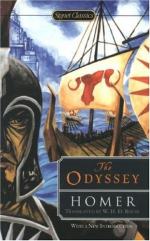Long and habitual reading of Homer appears to familiarize our thoughts even to his incongruities; or rather, if we read in a right spirit and with a heartfelt appreciation, we are too much dazzled, too deeply wrapped in admiration of the whole, to dwell upon the minute spots which mere analysis can discover. In reading an heroic poem, we must transform ourselves into heroes of the time being, we in imagination must fight over the same battles, woo the same loves, burn with the same sense of injury, as an Achilles or a Hector. And if we can but attain this degree of enthusiasm (and less enthusiasm will scarcely suffice for the reading of Homer), we shall feel that the poems of Homer are not only the work of one writer, but of the greatest writer that ever touched the hearts of men by the power of song.
And it was this supposed unity of authorship which gave these poems their powerful influence over the minds of the men of old. Heeren, who is evidently little disposed in favour of modern theories, finely observes:—
“It was Homer who formed the character of the Greek nation. No poet has ever, as a poet, exercised a similar influence over his countrymen. Prophets, lawgivers, and sages have formed the character of other nations; it was reserved to a poet to form that of the Greeks. This is a feature in their character which was not wholly erased even in the period of their degeneracy. When lawgivers and sages appeared in Greece, the work of the poet had already been accomplished; and they paid homage to his superior genius. He held up before his nation the mirror in which they were to behold the world of gods and heroes, no less than of feeble mortals, and to behold them reflected with purity and truth. His poems are founded on the first feeling of human nature; on the love of children, wife, and country; on that passion which outweighs all others, the love of glory. His songs were poured forth from a breast which sympathized with all the feelings of man; and therefore they enter, and will continue to enter, every breast which cherishes the same sympathies. If it is granted to his immortal spirit, from another heaven than any of which he dreamed on earth, to look down on his race, to see the nations from the fields of Asia, to the forests of Hercynia, performing pilgrimages to the fountain which his magic wand caused to flow; if it is permitted to him to view the vast assemblage of grand, of elevated, of glorious productions, which had been called into being by means of his songs; wherever his immortal spirit may reside, this alone would suffice to complete his happiness.”




